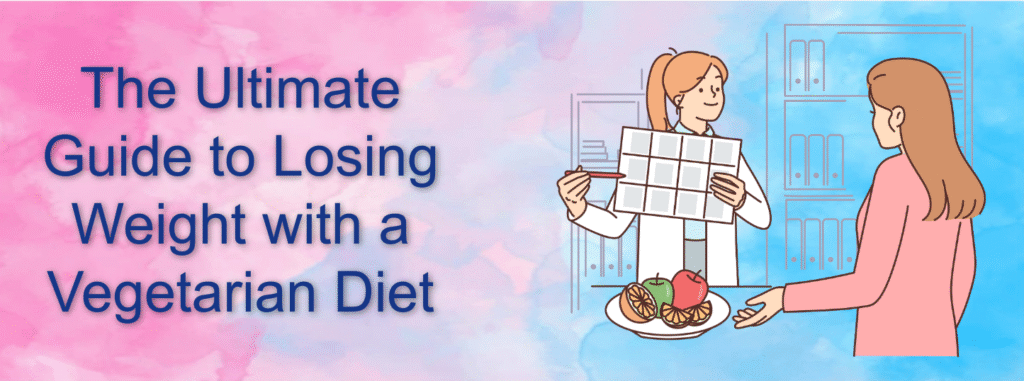The Ultimate Guide to Losing Weight with a Vegetarian Diet

Losing weight can be challenging, but a vegetarian diet makes it healthier and more sustainable. Whether you’re switching for ethical reasons, environmental concerns, or weight loss, it’s essential to maximize nutrition while maintaining a calorie deficit. This guide covers everything you need to know about losing weight on a vegetarian diet, including essential nutrients, meal planning, and lifestyle tips.
Why a Vegetarian Diet Helps with Weight Loss
A well-balanced vegetarian diet is rich in fiber, vitamins, and antioxidants while being lower in saturated fat. Here’s why it supports weight loss:
- Lower Caloric Intake – Plant-based foods generally contain fewer calories per serving than processed and animal-based options.
- Higher Fiber Content – Fiber keeps you full longer, reducing overall calorie intake.
- Reduced Processed Food Consumption – A whole-food vegetarian diet promotes nutrient-dense foods over unhealthy choices.
- Better Gut Health – A plant-based diet fosters a healthy gut microbiome, essential for metabolism and digestion.
- Improved Insulin Sensitivity – Research suggests a vegetarian diet enhances insulin sensitivity, aiding fat loss.
Key Nutrients for a Balanced Vegetarian Diet
While vegetarian diets offer many benefits, it’s crucial to ensure adequate intake of essential nutrients:
- Protein – Important for muscle maintenance and satiety. Sources: lentils, chickpeas, tofu, tempeh, quinoa, and dairy products.
- Iron – Found in spinach, lentils, and beans; consume with vitamin C-rich foods to enhance absorption.
- Vitamin B12 – Often lacking in plant-based diets, so consider fortified foods or supplements.
- Omega-3 Fatty Acids – Present in chia seeds, flaxseeds, and walnuts, essential for overall health.
- Calcium – Important for bone health. Sources: dairy products, fortified plant-based milk, tofu, and leafy greens.
- Zinc – Supports immune function and metabolism. Sources: nuts, seeds, and whole grains.
How to Lose Weight on a Vegetarian Diet
1. Maintain a Caloric Deficit
To lose weight, consume fewer calories than you burn. Tracking your intake with a calorie-counting app ensures you stay within limits while enjoying a balanced diet.
2. Prioritize Protein Intake
Protein preserves muscle mass and keeps you full. Include high-protein vegetarian options like:
- Soya chunks
- Greek yogurt
- Cottage cheese (paneer)
- Lentils and beans
- Nuts and seeds (almonds, chia seeds, flaxseeds)
3. Choose Whole, Nutrient-Dense Foods
Instead of relying on processed vegetarian foods, focus on whole grains, fresh vegetables, legumes, and healthy fats. This ensures balanced nutrition.
4. Incorporate Healthy Fats
Healthy fats boost satiety and overall health. Excellent sources include:
- Avocados
- Nuts and seeds
- Olive oil
- Coconut (in moderation)
5. Control Carbohydrate Intake
Carbohydrates are essential for energy, but focus on complex carbs like:
- Whole grains (brown rice, quinoa, whole wheat bread)
- Starchy vegetables (sweet potatoes, carrots)
- Legumes and beans
Avoid refined carbs like white bread, pastries, and sugary drinks, as they contribute to fat gain.
6. Plan Balanced Meals
A well-rounded vegetarian meal should include:
- Protein sources – Lentils, tofu, or paneer
- Fiber-rich foods – Vegetables and whole grains
- Healthy fats – Seeds, nuts, and olive oil
- Micronutrients – Found in vitamin-packed foods like bell peppers and leafy greens
7. Stay Hydrated
Drinking enough water supports digestion, manages hunger, and keeps metabolism functioning well. Aim for 2-3 liters daily.
8. Exercise Regularly
Pairing a vegetarian diet with consistent exercise enhances weight loss. Consider:
- Cardio – Walking, running, cycling
- Strength training – Bodyweight exercises, resistance workouts
- Yoga – Improves flexibility and mindfulness
9. Practice Mindful Eating and Portion Control
Eating slowly and controlling portions prevents overeating. Use smaller plates and chew food thoroughly for better satiety.
10. Limit Processed Vegetarian Foods
While convenient, many vegetarian options are not the healthiest. Reduce intake of:
- Fried snacks
- Sugary cereals
- Instant noodles
- Beverages with artificial sweeteners
Sample Vegetarian Meal Plan for Weight Loss
Breakfast:
- Oatmeal topped with chia seeds, nuts, and banana
- A glass of unsweetened plant-based milk or a cup of tea
Mid-Morning Snack:
- A handful of almonds and walnuts
- Greek yogurt with fresh berries
Lunch:
- Whole wheat roti with sautéed vegetables and paneer
- A bowl of lentil soup (dal)
Evening Snack:
- Roasted black chickpeas or sprouts
- A cup of green tea
Dinner:
- Quinoa salad with tofu and mixed vegetables
- A bowl of homemade vegetable soup
Post-Dinner (Optional):
- A glass of warm almond milk with a pinch of turmeric
Common Mistakes to Avoid
- Overeating Carbs – Even healthy carbohydrates can lead to weight gain if consumed in excess.
- Not Getting Enough Protein – Ensure every meal contains a protein source.
- Ignoring Healthy Fats – They aid nutrient absorption and satiety.
- Skipping Meals – This may cause overeating later.
- Not Exercising – Diet alone isn’t enough; physical activity is crucial.
- Drinking Calories – Avoid sugary drinks and excessive fruit juices to reduce calorie intake.
Conclusion
A vegetarian diet can be an excellent approach to weight loss while providing a variety of nutritious foods. By prioritizing whole, plant-based options, ensuring adequate protein intake, and maintaining a calorie deficit, you can achieve sustainable weight loss. Additionally, regular exercise, hydration, and mindful eating enhance results.
For more insights on vegetarian nutrition, explore this guide on plant-based diets and discover healthy meal ideas. Remember, consistency is key! Gradual changes, balanced meals, and a sustainable lifestyle will help you reach and maintain your ideal weight. Embrace a healthy lifestyle aligned with your goals. With the right approach, you can achieve your desired weight while feeling energetic and nourished.
USEFUL LINKS:
https://nutritionfacts.org/topics/weight-loss/
https://www.healthline.com/nutrition/vegetarian-weight-loss?utm_source=chatgpt.com
https://health.clevelandclinic.org/im-a-vegetarian-why-cant-i-lose-weight?utm_source=chatgpt.com

